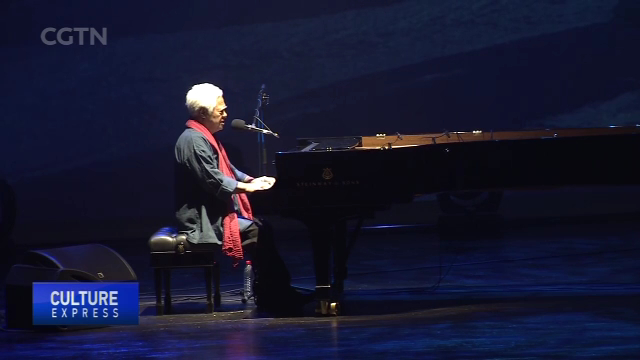
19:33, 05-Aug-2019
Yearning for the Mountain Valley: Indigenous Taiwan singer Ara Kimbo revisits Beijing
Updated
19:46, 05-Aug-2019

Ara Kimbo, better known as Hu Defu in Chinese, is a music phenomenon in Taiwan. The 69-year-old aboriginal singer-songwriter returned to Beijing's Tianqiao Performing Arts Center last Friday, to bring the breeze of the valley from his hometown to cool the summer heat. Our reporter Yang Ran was there.
It's a night to reconnect with nature. The audiences see the rolling mountains, the winding coastlines and most importantly, the life of the indigenous people of Taiwan, not from the videos shown on the screen, but from the music.
Kimbo presented his iconic hits like "Pacific Wind" and "In a Flash," and some time-honored ballads of Taiwan's aboriginal groups Puyuma, Pangcah Amis and Paiwan. What's more, he also brought some surprises to the literature enthusiasts.
ARA KIMBO SINGER-SONGWRITER "Some compositions are the combination of thousands of years old melody of our people, the indigenous people of Taiwan, and the poems without melody from the Yuan Dynasty. We put them together and sing it with the tunes of Paiwan. That is a new try and that match very much."
Born in 1950, Kimbo is regarded as the "Father of Taiwan Folk Music." He started his music career during the 1960s and has been devoting himself to protecting the rights of Taiwain aborigines since the 1980s. After a long hiatus from the music scene, he returned in 2005 and immediately caused a sensation again on both sides of the Straits with his nostalgic melodies and poetic lyrics.
Going into his 70s, he says his mission is far from being completed.
ARA KIMBO SINGER-SONGWRITER "I think I have the responsibility to let people know our things, our culture more than ever before when we only sang in our own languages. So in most part, I sing in both Chinese and my language. Music is the tool to understand each other."
YANG RAN BEIJING "People say they hear time flowing, the mountains and rivers of the hometown, and a man's life from his music. And Ara Kimbo says that he sings for his identity as an aboriginal that he is proud of, he sings for his people's bitterness, the ancestors' stories, and nature he and his people guard. And that makes him more than a great singer. Yang Ran, CGTN, Beijing."
SITEMAP
Copyright © 2018 CGTN. Beijing ICP prepared NO.16065310-3
Copyright © 2018 CGTN. Beijing ICP prepared NO.16065310-3